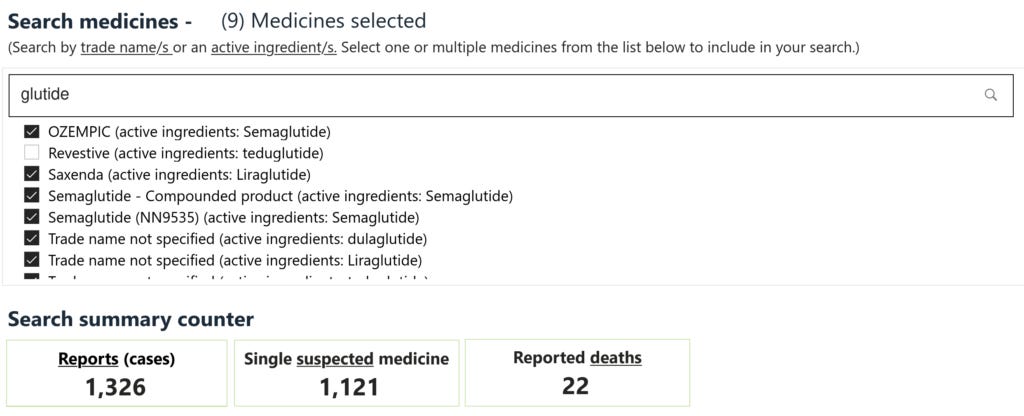The high price of weight loss: GLP-1 agonist side-effects
Blockbuster GLP-1 agonists like Ozempic are the latest craze for weight loss. Are the costs worth it?
In Part 1 of this miniseries on GLP-1 agonists, I summarised the actions exerted by glucagon-like peptide 1 (GLP-1), and described the mechanism of action of the GLP-1 agonist drugs such as Ozempic, Wegovy and Saxenda. It's important to understand these mechanisms, because they help to predict the kinds of side-effects that drugs might have1. And GLP-1 agonists have a lot of side-effects. Let's start with the most common ones.
Gut-churning side-effects
As one would expect from GLP-1 agonists' mechanism of action, the most frequently reported adverse effects are gastrointestinal: nausea, dyspepsia (indigestion/upset stomach), vomiting, diarrhoea and, in the case of semaglutide, constipation.
GLP-1 agonist-associated nausea can be triggered by continuing to eat once one is already full (which is a fairly common habit among obese people), but it can also occur throughout the day, as my cousin reported to me. And the vomiting and diarrhoea can be so intense that the resulting fluid loss causes acute kidney injury.
A systematic analysis of clinical trials of GLP-1 agonists found that the risk of nausea and vomiting was dose-dependent (i.e. the higher the dose, the more likely patients were to experience these side-effects). In contrast, diarrhoea occurred at similar frequencies in lower and higher dose groups, except in the case of dulaglutide (Trulicity). Long-acting GLP-1 agonists - those injected once per week - were associated with less nausea and vomiting, but more diarrhoea, than short-acting agents that have to be injected once to twice per day. Which would you prefer - nausea and vomiting, or diarrhoea? (Or tick Box C: neither of the above.)
A meta-analysis of four randomised controlled trials of semaglutide (Ozempic, Wegovy) claimed that these gastrointestinal side-effects "were of mild to moderate severity and short duration that resolved without treatment", but that certainly wasn't my cousin's experience. And if you read the full text of one of the studies included in the meta-analysis, you'll find this:
"The proportion of participants experiencing nausea with semaglutide peaked at approximately 25% at week 20 and declined thereafter, remaining at approximately 15% for the duration of the study."
Does that description fit with your definition of "short duration that resolved without treatment"?
That same meta-analysis of four randomised controlled trials of semaglutide summarised the adverse events profile as follows:
"The risk of developing gastrointestinal adverse events was 1.59 times more likely with semaglutide (RR 1.59, 95%CI [1.34, 1.88], p<0.00001). Risk for discontinuation due to adverse events was twice as likely in the semaglutide group (RR 2.19, 95%CI [1.36,3.55], p=0.001) and the risk for serious adverse events was 1.6 times more likely for semaglutide (RR 1.60, 95%CI [1.24, 2.07], p=0.0003). Serious events were mostly of gastrointestinal and hepatobiliary disorders such as acute pancreatitis and cholelithiasis [gall stone disease]."
As concerning as the rates of adverse reactions reported in clinical trials are, they're just the tip of the iceberg. As a study of health insurance claims records for 16 million patients noted,
"Randomized trials examining efficacy of GLP-1 agonists for weight loss were not designed to capture these [gastrointestinal adverse] events2 due to small sample sizes and short follow-up."
Furthermore, when participants are selected for clinical trials, all sorts of exclusion criteria are applied which - intentionally or otherwise - minimise the risk of adverse drug reactions. But once a drug has gained regulatory approval and is unleashed onto the market, it will be taken by people with all manner of comorbidities, many of them taking multiple other medications which could interact with the new drug in unpredictable ways.
In the health claims database study, researchers compared outcomes for biliary disease (including cholecystitis, cholelithiasis, and choledocholithiasis), pancreatitis (including gallstone pancreatitis), bowel obstruction, or gastroparesis, in obese patients prescribed one of three different weight loss drugs: liraglutide, semaglutide, and the non-GLP-1 agonist bupropion-naltrexone. Here's what they found:
"Use of GLP-1 agonists compared with bupropion-naltrexone was associated with increased risk of pancreatitis (adjusted HR, 9.09 [95% CI, 1.25-66.00]), bowel obstruction (HR, 4.22 [95% CI, 1.02-17.40]), and gastroparesis (HR, 3.67 [95% CI, 1.15-11.90) but not biliary disease (HR, 1.50 [95% CI, 0.89-2.53])."
For those unfamiliar with the lingo, 'HR' stands for hazard ratio, which is "a comparison between the probability of events in a treatment group, compared to the probability of events in a control group." A hazard ratio of 9.09 for pancreatitis means that people taking a GLP-1 agonist were over 9 times more likely to suffer this outcome, than people taking bupropion-naltrexone.
Gallstone formation is a known risk of rapid weight loss (> 1.5 kg per week) by any means, so it's not too surprising that both categories of weight loss drug were associated with excess risk of cholelithiasis. It should be noted though, that while rates of biliary disease were similar in people taking semaglutide and bupropion-naltrexone (11.7 and 12.6 cases per 1000 person years2 respectively), the rate in liraglutide users was much higher: 18.6 per thousand person years.
Rates of pancreatitis per 1000 person years were 4.6 for semaglutide, 7.9 for liraglutide, and 1.0 for bupropion-naltrexone. (Recall that only liraglutide [Saxenda] is approved by the TGA as a weight loss agent in Australia.)
Furthermore, while only mild acute pancreatitis was reported in one of the clinical trials for semaglutide, in post-marketing surveillance there have been case reports of the most dangerous - and potentially fatal - manifestations of pancreatitis, the haemorrhagic and necrotising types.
The tragic story of Trish, a woman who died after taking Saxenda and Ozempic to lose weight for her daughter's wedding, may well have been a case of fatal pancreatitis.
Wait, there's more
Other commonly-reported side-effects include:
Dizziness
Mild tachycardia (racing heart)
Infections
Headaches
Swelling and itching around the injection site.
Furthermore, after repeated injections, patients can start to form antibodies to GLP-1 agonists; exenatide (Byetta, Bydureon) is particularly prone to this immunogenic effect. The antibodies not only reduce the efficacy of the medication (could this be one of the reasons why efficacy levelled off or reversed toward the end of the STEP trials?), but could also lead to injection site reactions, and even anaphylactic reactions.
The European Medicines Agency (EMA) has raised a safety signal about the potential link between GLP-1 agonists and thyroid cancer, while the FDA has already slapped semaglutide and tirzepatide (Mounjaro), a drug which combines GLP-1 and glucose-dependent insulinotropic polypeptide (GIP) agonist activity, with boxed warnings (formerly known as 'black box warnings') for thyroid cancer.
And just to put the icing on the cake, truth warrior
brought my attention to the Australian Public Assessment Report (AUSPAR) for Semaglutide, which referred obliquely to concerns about "the endotoxin aspects of safety". As Geoff highlights in this article, semaglutide (and all the other GLP-1 agonists) are produced by biological fermentation through gene recombination technology, and the resulting products are contaminated with residual DNA and endotoxin from the bacteria used in this process.Endotoxin, as I have discussed in several previous articles, is a powerful bacteria-derived trigger of inflammation, and is associated with reduced glucose tolerance (which can eventually lead to diabetes), body weight gain, fat mass development and oxidative stress. Sounds like a good thing to have in your diabetes and weight loss drug.
GLP-1 agonists are contraindicated in pregnant women, and in people with gastroparesis (stomach paralysis), inflammatory bowel disease, severe renal dysfunction (since the drug is eliminated chiefly by the kidneys), a history of pancreatitis, and a personal or family history of thyroid cancer or its precursors.
Going out of your mind to lose weight?
Still think GLP-1 agonists might be worth the risk? Let's take a look at the psychiatric adverse effects. The STEP 3 trial reported 18.4 events of "psychiatric disorders" per 1000 person years in participants randomised to semaglutide, compared to 11.9 per 1000 person-years in placebo recipients. Four participants dropped out of the trial because of new-onset or worsening anxiety, and of these, three had been taking semaglutide.
Anxiety is bad enough, but after reports to the Icelandic medicines agency of suicidal thoughts and self-injury in people using liraglutide and semaglutide, in July 2023 the Pharmacovigilance Risk Assessment Committee of the EMA launched a review of these harms in people taking any of the GLP-1 agonists. By this time, the EMA had retrieved "about 150 reports of possible cases of self-injury and suicidal thoughts" for analysis. As of December 2023, the case reports had climbed to "at least 170" and the EMA had requested more information from the pHarma companies that produce these drugs.
Meanwhile, by October 2023, the US Food and Drug Administration (FDA) had received 265 reports of suicidal thoughts or behaviour in people taking GLP-1 agonists, including 36 deaths by suicide or suspected suicide, since 2010. The news agency Reuters obtained 113 detailed narratives from these FDA reports. Here's a taste of what they found:
"More than half of the narrative summaries describe suicidal thoughts appearing shortly after the person started the medicine or increased the dose. About two fifths of them said symptoms ceased after the patient stopped taking the drug or lowered the dose.
Thirty of the 113 narratives described patients with a history of depression, suicidal thinking or another mental-health condition. Another five reports explicitly said the patient had no history of psychological issues. Most reports don’t address that medical history."
Wegovy, other weight-loss drugs scrutinized over reports of suicidal thoughts
In an analysis of 230 reports of suicidal events to the European Pharmacovigilance Database, published in February 2024, liraglutide had the highest reporting probability of suicidal ideation and suicide attempts, followed by semaglutide. Reporting probability was lower for dulaglutide and exenatide.
However, only liraglutide (Saxenda) carries an FDA warning for this adverse effect, because suicidal thoughts or behaviours were documented during the clinical trials used to gain regulatory approval for the drug. This takes 'dying to lose weight' to a whole new level.
You might argue that in the context of the millions of doses of GLP-1 agonists that have been taken thus far, a few hundred reports of suicidal ideation and acts of self-harm isn't exactly Defcon 1. But this possible adverse reaction is highly probably underreported, due to both the stigma that still surrounds mental health issues, and the fact that neither patients nor their doctors are likely to link thoughts of, or actual, self-harm to the drugs.
I can't quit you baby
How many people stop taking GLP-1 agonists due to their side-effects? Fewer than you might think, given the preceding discussion, which speaks to the sheer desperation that many obese and/or diabetic people experience about their conditions.
A systematic review and network meta-analysis of 76 trials involving 15 GLP-1 agonist drugs and 39, 246 participants found that lixisenatide had the highest rate of discontinuation due to adverse events, followed by semaglutide, exenatide, tirzepatide and liraglutide.
Six per cent of patients included in the meta-analysis of randomised clinical trials of semaglutide discontinued semaglutide due to adverse effects, compared to an average of ten per cent across the entire class of GLP-1 agonists. That means that nine in ten people are either lucky enough to dodge the side effects, or are prepared to put up with them.
What would Robert Plant have to say about this?
To sum it all up, GLP-1 agonists cause a host of nasty side-effects, ranging from the inconvenient to the life-threatening, and they may in fact kill you; so far, 22 deaths have been reported to the TGA in the context of taking a GLP-1 agonist:
But they are very effective at causing weight loss. The question is, what kind of weight are people losing - muscle or fat? And I'll answer that question in Part 3. Stay tuned!
This post has taken approximately 15 hours to research and write. If you feel you’ve obtained value from reading it, please consider a paid subscription:
For information on my private practice, please visit Empower Total Health. I am a Certified Lifestyle Medicine Practitioner, with an ND, GDCouns, BHSc(Hons) and Fellowship of the Australasian Society of Lifestyle Medicine.
As I emphasised in Stop calling them ‘side effects’,
"There are no ‘side-effects’ of drugs. Every change that a drug causes is an effect. Some of those effects are desirable to doctor and patient; some are undesirable, but all result from interference with human physiology."
A person year is the equivalent of one person taking a medicine for one year.






Excellent article and break down is such pertinent information Dr Robyn. I have to say that a pharmacy technician told me that people are so desperate to get their refills on their Glyp 1 RAs and they don’t want to report their side effects due to fear that the pharmacist or doctor might cancel their prescription. So they suffer in silence. This is so disturbing. And yes I also have heard about that case of a woman who was desperately trying to lost weight for her daughter’s wedding and did not take the excess nausea /vomiting seriously, ended up dying from pancreatitis. Of course when drugs are so widely prescribed, any side effect will look rare to the captured agencies and they will always say benefit exceeds risks . It’s an ongoing battle .
thank you for this article. Several people think I should lose some weight. Reading this, I think I will keep the few extra pounds.